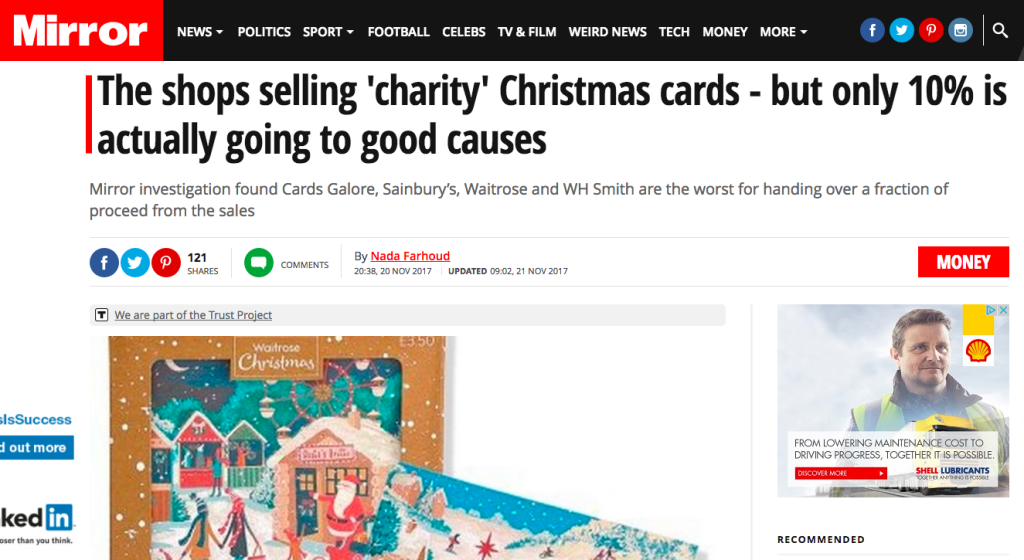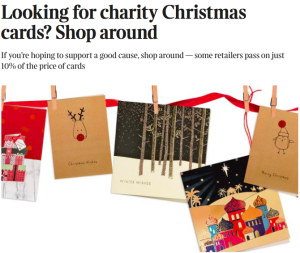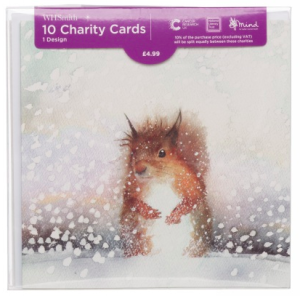Tis, (supposedly) the season to be jolly when goodwill to all is at its height, however the UK greeting card trade has received some unfair battering in the media over the issue of charity cards and the differing percentage contributions charities receive as a result of Christmas card sales.

The industry has been here before, with pot shots fired from the media when in actual fact it should be wholeheartedly applauded for the vast sums of money it raises for charities, through the no risk agreements with card publishers and retailers.
The Sunday Times and the Mirror have both made digs at the industry recently. Under the headline ‘The shops selling ‘charity’ Christmas cards, but only 10% is actually going to good causes’, The Mirror cited Cards Galore, Sainsbury’s Waitrose and WHSmith as being ‘the worst’ for ‘handling over a fraction of proceeds from the sales’, belittling the 10% that is donated to a great number of charities from the sale of the cards, ignoring the huge sums that are generated as a result of sales through these high footfall stores. Next’s and Clintons’ 15% contributions put them a step up with Aldi, with its 25% contribution being hailed the high street angel by the newspaper.

Not comparing like with like, the article urged readers to buy their cards Cards for Good Causes pop-up stores, which claims to give 70p in the £1 back to the charities. However the article ignores that in this instance, the charities take the risk and costs of production, plus the pop-up stores have nothing like the footfall of mainstream retailers.
Having got wind of the article being penned by the Mirror, some quick reactions from the GCA, Cards Galore and Sainsbury’s did at least mitigate against a totally one sided article in appearing in the Mirror online.
Tricia Corner, buyer of Cards Galore appeared, who quite rightly pointed out: “Few charities can sell cards through their own outlets, therefore the shelf space retailers give is invaluable. In a nutshell, 10% of something is better than 10% of nothing.”

Sainsbury’s was also able to get across its point about the huge sums that are raised by mainstream retailers. Its spokesperson said: ‘Last year we raised £millions for our charity partners through different fundraising activities.”
Meanwhile, in its article, The Sunday Times told its readers to ‘shop around’ for their charity cards as some retailers ‘just pass on 10% of the price of cards’.
The article suggests that card buyers may be ‘unpleasantly surprised to discover how little of the proceeds find their way to good causes’.
However the negative tone of the piece did lighten and went on to highlight the variety of charities that benefit from the industry’s tie-ups.
The piece homes in on Sainsbury’s (for sharing the 25p of a £2.50 pack between Comic Relief and the Royal British Legion), Waitrose for sharing its 10% with Crohn’s & Colitis UK, Young Minds and the Prince’s Countryside Fund and WHSmith for dividing 10% of the sale of some of its cards between Cancer Research, Mind and the National Literacy Trust. Clintons’ 15% contribution to Rays of Sunshine through the sale of its charity Christmas cards received some column inches as did Next, for its 15% donations to Macmillan Cancer Support, Barnardo’s, Diabetes UK and the British Heart Foundation, though Aldi was acknowledged as being ‘considerably more generous’ for giving over 25% to Teenage Cancer Trust via the sale of its £1.99 packs.

Retailers pledging distinct sums to charity, irrespective of the number of charity Christmas cards, were not criticised in the piece.
The Times highlighted how the Co-op will be making a £30,000 donation to the food poverty charity FareShare, as well as distributing 3m meals, which the supermarket told the newspaper works out at 14% of the retail price of the cards it sold last Christmas.
Other retailers making a donation, rather than going down the percentage route is Marks & Spencer, which is to donate £350,000 to Breast Cancer Now and Macmillan. Morrisons is giving £50,000 to the cancer charity Clic Sargent, irrespective of how many cards it sells.

The UK greeting card industry’s charitable contribution to the greater good is immense – whether it is indie retailers getting involved with their local causes, multiples pulling out the stops with major fundraising events, publishers raising £thousands for many worthwhile charities through card sales, and generous donations (of time, products and money), it certainly should be very proud.
The oft-spouted quote is that ‘charity begins at home’, but the home of greeting cards certainly does a great deal for charities. It is a good thought to remember in the next few weeks when nerves will be frayed in the vital countdown to Christmas.



















